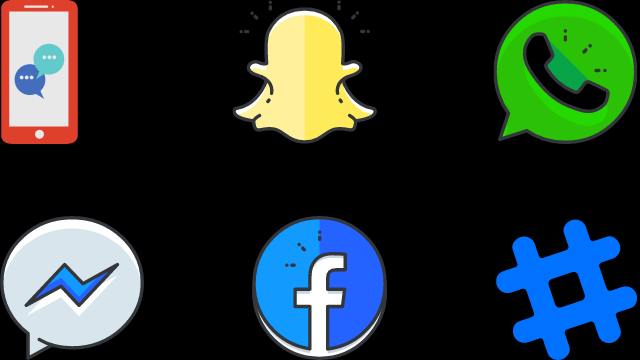What Is social media
| What Is social media |
What Is SOCIAL MEDIA: WHAT IS IT AND WHY IS IT USED?
Social media has become essential to a good marketing strategy. However, to use them effectively, it's necessary to completely understand their nature and their uses. So what exactly is social media? Why should you use them? Definition of social media and good practices.
What exactly is social media?
Fred Cavazza, renowned blogger in the field of social media, published a very precise definition of what is social media: "Social media refers to all the services that allow the development of discussions and social associations on the web or in a portable circumstance.""
According to his definition of what is social media, they therefore have three main interests:
Social media allows you to establish a dialogue with your community, and therefore a concrete relationship.
Social media makes it conceivable to create social collaborations ("like", "retweet", "sharing" ...) uncovering a responsibility with respect to a local area and prompting virility.
Social media allows you to communicate with your community at any time, even when on the move. In the age of smartphones and tablets, your target is perpetually connected and thus always likely to receive information.
Need to dig into the subject in depth? This book is essential:
Social media, social networks, are they the same or not?
There is a certain subtlety between the two and many people, even informed, continue to confuse the two concepts.
Social networks are indeed only part of social media: Facebook is social media, just like this blog or any forum.
Fred Cavazza, always him, published each year a very complete panorama of existing social media:
Main social media: Facebook, Twitter, LinkedIn, YouTube and Instagram (in the middle of the graph).
Social sharing media: they are used to share any type of content, in public or on one's network (photo and video, music, etc.).
Networking social media: they want to create and develop a network. Linkedin and Viadeo, for example, make it possible to create a professional network. They are therefore very useful within the context of a B to B activity.
Social discussion media (messaging): they allow discussion, instantaneous or not, between their members. Perhaps the best known of these is Skype. Forums are also discussion media.
Publishing social media: they are used to publish original content, articles, reports, tests ... These are mainly blogging platforms (WordPress, Blog spot ...).
Collaborating social media: these social media like Slack allow you to collaborate remotely. They are particularly widely used in project management.
The (fundamental!) Concept of community on social media
Since the beginning of this article what is social media, I've been examining neighborhoods, what's happening here?
The community should be at the center of your social media strategy. Indeed, she is the one you need to please, she is the one who will allow you to reach your goals (more visits to your website, more sales ...).
The more your community is engaged, the more chances you will have of achieving your goals and therefore of a satisfactory conversion rate.
Definition of a community on social media
Solidly, a local area is a bunch of individuals creating social communications, trades and disk around the same center of interest, a character or a brand, on all social media
.
Thus, my personal community includes subscribers to my twitter account, my Linkedin contacts, my Pinterest subscribers, Instagram, my Facebook contacts etc …
To properly handle the concept of community on social media and benefit from its full potential, it is essential to understand the 90/9/1% rule.
90% of your community listens to you (sometimes barely ...), 9% take part in conversations and 1% engage (the famous social interactions!)
There are 9 types of social media engagement:
The mass: all social media users, almost everyone
The inactive: they like your page, are subscribed to your Twitter account or your Youtube channel but never, or very rarely
Passives: they simply take notice of your publications that appear in their news feeds.
Clickers: they click on your publications to find out more
Sharers: they share your posts
Commentators: they comment on your posts
Givers: they make content around your image, your picture
Facilitators: they participate in the animation of your community, intervene with other members to provide them with information
The ambassadors: they intervene on social media for your brand. They stand up for you, advocate for you when you have negative comments. Ambassadors are the spokespersons of a brand.
Why use social media?
What is social media for?
I can't count the number of times I'm asked this question when I start social media training.
The question today should no longer be "What is social media for?" yet rather "How to utilize online media well?"
Social media is a must. A Marketing strategy that doesn't integrate social media lately is clearly not optimal.
Still wondering what social media is for?
Here are 7 reasons why you ought to integrate social media into your communication strategy:
Social media can increase your visibility and notoriety.
Social media can improve your referencing: the more links a site has pointing to its pages, the better it will be referenced (see article on popularity and referencing). Social networks therefore represent the chance to distribute and distribute links to the pages of your website and thus optimize their positioning in search engines.
Social media can get more traffic.
Social media makes it possible to find new customers and partners.
Social media makes it possible to manage customer relations in real time.
Social media allows you to manage your e-reputation (your online reputation).
Social media permits you to continually screen your market continuously..
But, what is social media for?
We have seen the definition of what is social media,
4 central issues for conveying great via web-based media
It is not enough to know, in theory, the definition of social media and its benefits to generate ROI.
To communicate well on social media, it is essential to respect some good practices.
 |
| What Is social media |
1. Know your target
To understand what is social media for, and what it can bring you, it's important to understand who your target is.
We are talking about Persona Marketing.
The idea here is above all to understand what your target is doing with social media. What social media does she use? What are its uses?
You need to understand the expectations and wishes of your target to speak well on social media.
2. You have to work on a documented strategy
Here, we will get straight to the point.
To generate ROI with social media, it is imperative to work on a documented social media strategy.
Got an online media technique however it's in your mind?
You don't have a strategy.
Here, I highly recommend that you read our guide:
The 8 fundamentals for communicating well on social media
3. Use the right social media
What is social media for you ask?
Each online media has its uses, yet not all web-based media is for you.
I meet too many companies that invest on all social media thinking they will have a better chance of winning customers.
Big mistake.
These companies learn it the hard way, and it is they who are then convinced that social media is useless.
To communicate well on social media, it's important to pick them well.
How? 'Or' What ? Depending on your target.
The key is to keep your eyes down and limit yourself to a number of social media that you can manage effectively according to your financial, human, time, and skill sets.
Which social media to choose in B2B?
4. you've got to figure on an article calendar
As we have seen in our definition of social media, their vocation is to share content with high added value.
To communicate effectively on social media, it is essential to share content tailored to your target on a regular basis.
The content you share on social media must add value to your target audience.
Hence the importance of working on your Personas, again.
To effectively share content on social media, it's essential to figure on an article calendar.
The editorial calendar will let you know exactly what you need to post on social media day in and day out.
Useful to avoid wasting time with white sheet syndrome. Believe me.
Conclusion
We discussed what is Social media, social medias are therefore essential in this age of digital communication.
However, it is important to take the time to design a comprehensive social media strategy in order to use them wisely and thus achieve the goals you set for yourself.
Without a methodology, the assets that you will prepare in the administration of your online media will be squandered and may even adversely affect your image (eg: awful buzz… ).
You will understand, social media has an exceptional strike force but should be handled with a grain of salt.








Please do not enter any spam link in the comment box.